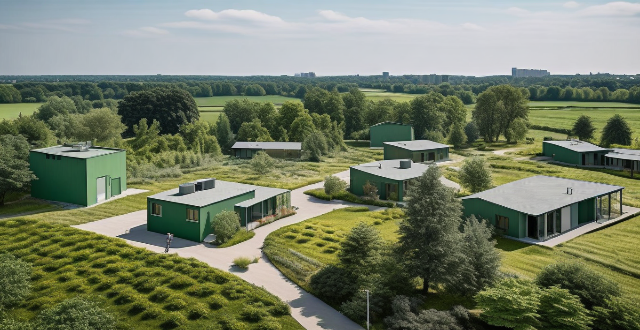Urban green spaces provide economic benefits to cities, including increased property values, reduced air pollution, and enhanced tourism. These spaces improve the living environment, leading to higher home and rental prices, increased tax revenue, and healthcare cost savings. Additionally, they attract tourists, boosting the local economy through job creation and multiplier effects. Investing in urban green spaces is beneficial for both the environment and city prosperity.

Economic Benefits of Urban Green Spaces
Urban green spaces, such as parks, gardens, and forests, provide a range of economic benefits to cities and their residents. These benefits can be categorized into three main areas: increased property values, reduced air pollution, and enhanced tourism.
Increased Property Values
One of the most significant economic benefits of urban green spaces is the increase in property values that they bring. Studies have shown that homes located near green spaces tend to be more expensive than those without access to such amenities. This is because green spaces are highly valued by homebuyers and renters alike, who are willing to pay a premium for the added aesthetic appeal, recreational opportunities, and health benefits that come with living close to nature.
- Higher Home Values: Properties near green spaces command higher prices due to increased demand from buyers seeking a more pleasant living environment.
- Rental Income: Landlords can charge higher rents for properties located near green spaces, as tenants are often willing to pay more for the added amenity.
- Property Tax Revenue: As property values rise, so does the tax revenue generated by these properties, providing additional funding for city services and infrastructure.
Reduced Air Pollution
Urban green spaces play a crucial role in reducing air pollution levels within cities. Trees and other plants act as natural filters, absorbing pollutants such as carbon dioxide, sulfur dioxide, and nitrogen oxides from the air. This not only improves air quality but also has economic implications by reducing healthcare costs associated with respiratory illnesses caused by poor air quality.
- Healthcare Cost Savings: Improved air quality leads to fewer respiratory illnesses, resulting in lower healthcare costs for individuals and governments.
- Productivity Gains: Cleaner air leads to better overall health, which can translate into increased productivity and reduced absenteeism in the workforce.
- Environmental Regulation Compliance: By reducing air pollution levels, cities can avoid costly fines and penalties associated with non-compliance with environmental regulations.
Enhanced Tourism
Urban green spaces serve as attractive destinations for tourists, both domestic and international. Parks, gardens, and other natural attractions draw visitors seeking relaxation, recreation, and cultural experiences. The presence of these green spaces can significantly boost a city's tourism industry, leading to increased revenue from visitor spending on accommodations, food, entertainment, and transportation.
- Tourist Attractions: Green spaces serve as unique and appealing tourist destinations, attracting visitors from around the world.
- Ecotourism Opportunities: Cities can develop ecotourism initiatives focused on sustainable travel experiences within their green spaces.
- Job Creation: The growth of the tourism industry leads to job creation in sectors such as hospitality, retail, and transportation.
- Multiplier Effects: Tourism revenue generates further economic activity through multiplier effects, benefiting local businesses and communities.
In conclusion, urban green spaces offer numerous economic benefits to cities and their residents. By increasing property values, reducing air pollution, and enhancing tourism opportunities, green spaces contribute to the overall prosperity and livability of urban areas. Investing in the development and maintenance of urban green spaces is not only beneficial for the environment but also makes sound economic sense for cities looking to thrive in the modern era.